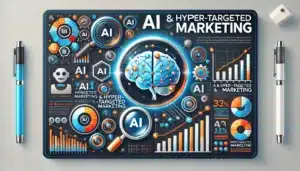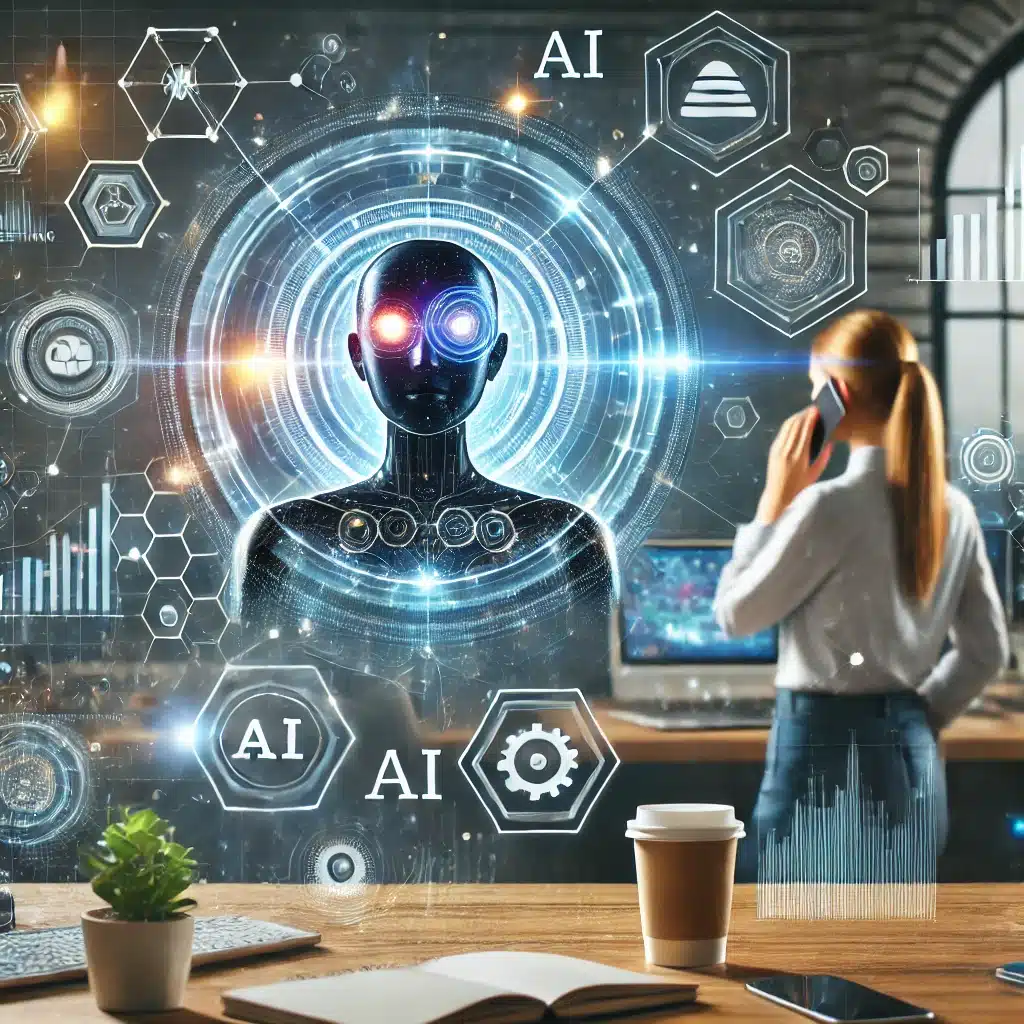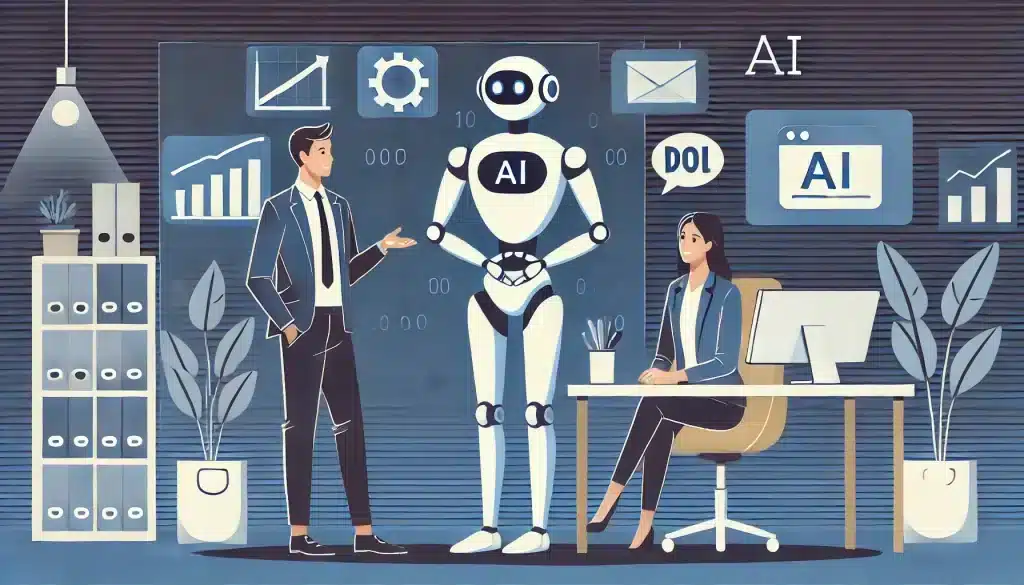In today’s digital world, businesses need to stand out by delivering clear and impactful messages. Customers are bombarded with ads, making it harder for companies to grab attention. This is where artificial intelligence (AI) comes in. AI offers tools and insights that help businesses create personalized Hyper-Targeted Marketing campaigns. These campaigns focus on specific audience groups, making the message more relevant and effective.
AI works by analyzing large amounts of data to find patterns in consumer behavior. It helps businesses create strategies that do more than just attract attention—they drive action and engagement.
How Can AI Help in Creating Personalized Hyper-Targeted Marketing Campaigns?
Understanding the Role of AI in Personalization
AI plays an important role in personalization by analyzing masses of data, which throws light on consumers’ patterns of behavior. Using AI, marketers will be in a position to create targeted experiences that reflect the current needs and wishes of your target audience. This enables a business to look into customer behavior, such as history of purchase and browsing activity, which allows it to effectively tailor its marketing efforts. Such AI-Powered personalization ensures the right message is sent to the right audience at the right time, which translates into more engagement and drives more conversions.
Generative AI: A Tool for Tailoring Campaigns
Generative AI is revolutionizing how campaigns are designed. Such content creation will also make it possible for generative AI tools to assist marketers in creating messages that resonate with specific audience segments while still being relevant and compelling. With the help of generative AI, marketers will be able to create tailored advertisements and promotional materials to appeal to the interests and preferences of their target market. This level of personalization boosts the potential for attracting and activating consumer interest, enhancing the success of the campaigns.
Real-time Data and Its Impact on Personalization
Real-time data integration into marketing activities will be crucial in making the concept of effective personalization come to life. The application of AI can facilitate the access and analysis of real-time data to quickly get a sense of the latest trends and consumer preferences. This will enable the company to optimize its campaign on the fly, making sure that it is current and interesting. Marketers, by using AI for analyzing real-time data, are able to make the most informed decisions to make personalization strategies better and increase campaign performance.

What Are the Benefits of AI in Marketing for Targeted Ads?
Higher Engagement Through AI-Powered Campaigns
The most significant benefit of AI in marketing is the driving of more engagement via AI-driven campaigns. Through predictive analytics and machine learning algorithms, marketers can develop targeted ads that speak directly to their audience’s interests. This will raise the chances that attract consumer attention, create more interactions, and higher rates of engagement. This consequently means that businesses can forge closer relationships with their customers, leading to brand loyalty and repeat sales.
Optimizing Ads with AI for the Right Audience
AI allows marketers to refine their ad campaigns to target the appropriate audience by making sense of data and recognizing which channels are most effective at reaching customers. Knowing the audience that is most likely to respond to certain products or services, marketers can fine-tune their ads to optimize performance. Such optimization improves the efficiency of marketing but also maximizes return on investment, thereby making every ad dollar count.
Predictive Analytics and Its Role in Targeted Marketing
Predictive analytics is a powerful tool that allows marketers to forecast future consumer behavior based on historical data. By leveraging predictive analytics, businesses can develop targeted marketing strategies that anticipate customer needs and preferences. This foresight enables marketers to create campaigns that resonate with their audience, ultimately leading to higher conversion rates. The ability to predict customer actions empowers marketers to craft messages that align with their audience’s expectations, resulting in more effective marketing efforts.
How to Leverage AI for Effective Marketing Strategies?
Creating AI-Driven Marketing Strategies
Marketers have to develop AI-based marketing strategies that include advanced analytics and machine learning in order to use AI effectively. This way, using AI tools, businesses can extract insights from a diverse range of data sources, such as social media interactions, website traffic, and customer feedback. This all-inclusive understanding of consumer behavior empowers marketers to craft relevant and impactful campaigns. As such, businesses can ensure that they remain competitive in the digital landscape through embracing AI in their marketing strategies.
Tailoring Campaigns with AI Insights
AI insights are critical to tailoring campaigns to suit the diverse needs of various audience segments. By analyzing data from multiple touchpoints, AI can help marketers identify key characteristics of their target audience, which means creating hyper-targeted campaigns. These campaigns can be personalized based on demographics, interests, and behaviors to ensure that the content delivered resonates with consumers on a deeper level. That’s why this approach enhances the likelihood of engagement and conversion, making AI an invaluable asset in modern marketing.
Optimizing Marketing Efforts Using AI Analytics
AI analytics equips marketers with the tools to continually optimize their marketing efforts. With real-time campaign performance tracking, businesses can quickly determine which strategies are paying off and which ones require adjustments. This process of continuous optimization allows marketers to fine-tune their approach, ensuring that every campaign is as effective as possible. By applying AI analytics, marketers can enhance their comprehension of what is driving the engagement of their customers, thus tailoring strategies in alignment with this for a higher marketing outcome.
What is the Future of AI Marketing and Personalization?
AI will continue to evolve, becoming a critical part of digital marketing. As technology improves, businesses will use AI to create even more targeted campaigns. It will also influence consumer behavior, shaping expectations for personalized experiences.
Emerging trends like voice search, chatbots, and augmented reality will further enhance marketing strategies. Responsible use of AI and attention to data privacy will be essential as businesses explore new ways to connect with their audience.
The Evolution of AI in Digital Marketing
AI in digital marketing is destined to continue with continuous evolutions and innovation. The increasing sophistication of technology will also make AI more deeply intertwined with marketing strategies, leading to more hyper-targeted campaigns. This will mean marketers can react to consumer behavior in real time due to the unprecedented speed at which AI analyzes data. That will not only mean enhancing personalization but redefine the way brands interact with their consumers to create even deeper relationships.
Impact of AI on Consumer Behavior and Preferences
The impact of AI on consumer behavior is significant because it molds the way consumers engage with brands. As consumers grow accustomed to these experiences, their expectations for customized marketing will continue to increase. Marketers must learn to adapt to this shift by using AI to fulfill the evolving preferences. With the understanding of the impact of AI on consumer behavior, businesses can develop strategies that work for their audience, increasing loyalty and driving repeat sales.
Emerging Trends in AI-Powered Marketing
With AI continuing to transform marketing, several emerging trends shape the future of AI-powered marketing strategies. The growth of voice search and chatbots, for example, are changing the game; marketers must stay on top of these developments to be relevant. Data privacy and the responsible use of AI will be increasingly important issues, among others. More than that, AI will be integrated with other technologies, like augmented reality and virtual reality, to offer new opportunities for hyper-targeted campaigns that engage consumers in innovative ways. The exploration of these trends allows marketers to fully utilize AI to improve their marketing activities.
How Can Marketers Use AI to Hyper-Target Audience Segments?
Defining Audience Segments with AI Analytics
Defining audience segments through AI analytics involves analyzing consumer data in order to identify distinct groups with shared characteristics. Using AI tools, marketers can divide their audience based on many factors, including demographics, purchasing behavior, and levels of engagement. This type of segmentation allows businesses to create hyper-targeted campaigns that speak directly to the interests and needs of each segment, thereby making their marketing strategies more effective.
Real-Time Optimization of Campaigns with AI
Real-time campaign optimization is vital for keeping the marketing campaigns relevant and effective. Marketers can use AI to monitor campaign performance in real time and make adjustments to optimize engagement and conversion rates. Using AI’s capabilities will help businesses keep their campaigns in line with consumer preferences and respond rapidly to market changes, thus making the marketing approach agile and effective.
Utilizing Machine Learning for Enhanced Targeting
Conclusion
AI has revolutionized the way businesses approach marketing, offering tools to create hyper-targeted campaigns that resonate deeply with consumers. By harnessing AI’s capabilities, marketers can analyze real-time data, tailor content to specific audience needs, and optimize strategies for maximum impact. As AI continues to evolve, its integration into marketing will further enhance personalization, engagement, and customer loyalty.
Embracing AI-driven strategies is no longer optional—it’s essential for staying competitive in today’s dynamic digital landscape. By leveraging the power of AI, businesses can not only meet but exceed customer expectations, driving growth and building lasting connections with their audience.



